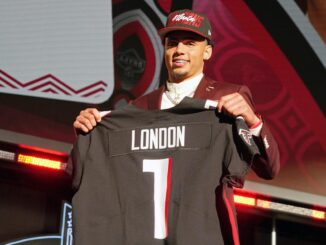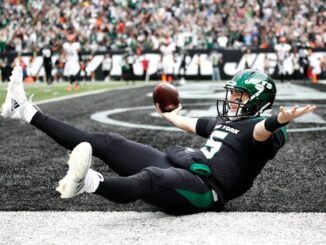
It’s almost playoff time, and we have 14 teams ready and raring to go. The NFC is a difficult conference to get a feel for this year, with a handful of teams that are still tough to pin down as to how good they really are. With that in mind, here are the biggest questions facing all seven NFC teams in the 2022 postseason.
Philadelphia Eagles
Can Jalen Hurts recapture his early season form?
Hurts returned to action in Week 18 after missing two games with a shoulder strain. The performance he put up against the Giants in that game was undoubtedly his worst of the season by a comfortable margin. He completed just 57.1% of his passes and averaged just 6.5 yards per attempt. It also marked just the second time this season he had multiple turnover-worthy plays in a game.
The Giants made his life hell with a blitz-happy approach (66.7% of his dropbacks) and some might now see that as the key to slowing this Eagles offense down. The question is whether this was simply a case of Hurts knocking off the rust, or something more concerning. Eagles fans everywhere will be praying it was the former.
San Francisco 49ers
Is Brock Purdy good enough to go all the way?
Purdy has been the unlikely success story in the NFL this season. When the 49ers were forced to turn to their third-string seventh round rookie, many people (myself included) considered their season to be over. Fast forward to the playoffs and Purdy is unbeaten in six games and the 49ers look like legitimate contenders.
The question is whether he has what it takes to perform at a high level against the NFL’s best. After all, just one of Purdy’s wins have come against a defense that ranks in the top 10 in DVOA this season. The surrounding cast is good enough to make up for some of that, but we’ve seen the 49ers fall short in the playoffs before thanks to shortcomings at quarterback. Will history repeat itself in 2023?
Minnesota Vikings
Can they fix their running game?
The Vikings have long been known for an offense built around their running game. That hasn’t been the case this season, and their inability to lean on the running game when it matters has often prevented them from pulling away from opponents. Minnesota ranks 28th in rushing DVOA this season. They are the worst short yardage rushing team in football and also rank 32nd in the percentage of runs that are stuffed at or behind the line of scrimmage.
They have been able to get away with it – and only just – throughout the regular season, but things are different once you make the playoffs. Kirk Cousins isn’t the kind of quarterback that is capable of carrying a team and opponents will be able to sell out against the pass, safe in the knowledge Minnesota present no threat on the ground. If they are to have any chance of postseason success they need to force opponents to respect their running game, but can they?
Tampa Bay Buccaneers
Is the offensive line going to be able to hold up against top competition?
The Bucs’ issues along the offensive line have been a question mark all year, and that’s only going to get more pronounced in the playoffs. We have seen the issues it presents already. They sit all the way down in 28th in adjusted line yards. They have also seen 19% of runs stuffed at or behind the line. Their issues in pass protection have only been mitigated by Tom Brady getting rid of the football in record time to nullify pressure.
That’s a reactive solution to a pretty major problem. It has also served to make the Bucs pretty predictable and stale as a passing offense, with defenses able to sit on underneath routes safe in the knowledge that Brady doesn’t have the time to let deeper routes develop. We’ve seen that when protection holds up that this is an offense still capable of winning downfield – just look at the Panthers game – but whether they can do the same against a different calibre of opponent remains unanswered.
Dallas Cowboys
Do you they have the requisite depth in the secondary?
The Cowboys lost their starting slot cornerback Jourdan Lewis in Week 7. They then lost Anthony Brown to a torn Achilles in Week 13. Since then they have been forced to patch up their secondary with young and inexperienced cornerbacks, including rookie DaRon Bland and second-years Kelvin Joseph and Nashon Wright. Results have been mixed, but there is no doubt the Cowboys have seen a real drop off on defense.
Prior to Brown’s Week 13 injury the team led the NFL in EPA per dropback. In the five games since they have fallen to 11th. It is also worth noting that three of those games came against the Texans, Titans, and Commanders – hardly teams with good passing games. They have allowed a league-high 21 explosive pass plays in that period too. They need to turn this around to have any chance of pushing for postseason success.
New York Giants
Can the patchwork passing game keep outproducing its talent?
Credit to Brian Daboll – he’s built a playoff team with Daniel Jones at quarterback and a receiving room led by Darius Slayton, Richie James, and Isaiah Hodgins. In most other offenses these guys are depth pieces, not starters. The big question here is how sustainable their production is when they go up against the best teams in the conference this postseason.
Their lack of explosive ability in the passing game has already been painfully apparent. Their 28 explosive passing plays rank dead last this season. For context, no other playoff team ranked lower than 18th, and all of them had at least 50 such plays. This means defenses can sell out against the run and focus their attempts on Saquon Barkley, who is averaging just 3.7 yards per carry against eight man boxes. It feels at some point like the wheels will fall off for this offense.
Seattle Seahawks
Is their run defense good enough?
Bad run defenses are like kryptonite in the playoffs, as anyone who watched the 2019 NFC Championship game can attest. The Seahawks have had real problems against the run all year, ranking all the way down at 25th in rushing DVOA. They also rank 25th in both adjusted line yards and stuffed run rate. This is all the more concerning ahead of a game against Kyle Shanahan and the 49ers.
The two teams have faced off twice already this year. In those two games the 49ers averaged 180 rushing yards per game at 4.5 yards per attempt. 74% of that came after contact and they had five runs of 15+ yards. The Seahawks can’t afford to have another performance like that, but can they do anything to turn their inadequate run defense around?


